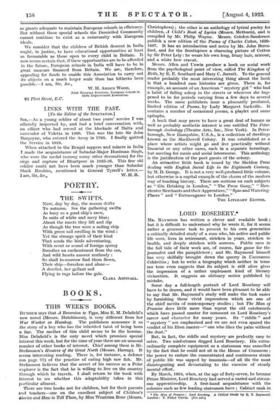BOOKS.
THIS WEEK'S BOOKS.
RUMOUR says that A Reversion to Type, Miss E. M. Delafield's new novel (Messrs. Hutchinson), is very different from her War Worker or Humbug. The publishers announce it as the story of a boy who has the inherited taint of being born a liar. The mother of this child seems to be the heroine. Miss Delafield's is the only novel which promises special interest this week, but for the time of year there are an unusual number of other books of interest. Chief among these is Mr. Stefansson's Hunters of the Great North (Messrs. Harrap). It seems interesting reading. There is, for instance, a defence (on page 77) of the practice of eating high raw fish. Mr. Stefansson believes that the secret of his success as a Polar explorer is the fact that he is willing to live on the country through which he travels. I shall return to the book with interest to see whether this adaptability takes in this particular aliment.
There are two books not for children, but for their parents and teachers—one on the excellent subject of Children's Stories and How to Tell Them, by Miss Woutrina Bone (Messrs. Christophers) ; the other is an anthology of lyrical poetry for children, A Child's Book of Lyrics (Messrs. Methuen), and is compiled by Mr. Philip Wayne. Messrs. Cobden-Sanderson publish a new edition of the Poems of Charles Cotton, 1630- 1687. It has an introduction and notes by Mr. John Beres- ford, and for the frontispiece a charming picture of Cotton by Sir Peter Lely : he wears his own long, frizzy hair, armour, and a white bow cravat.
Messrs. Allen and Unwin produce a book on social work from the psychological point of view, called The Kingdom of Evils, by E. E. Southard and Mary C. Jarratt. To the general reader probably the most interesting thing about the book is that a hundred case histories are given. There is, for example, an account of an American " mystery girl " who had a habit of falling asleep in the streets or wherever she hap- pened to be for periods varying from a few days to several weeks. The same publishers issue a pleasantly produced, limited edition of Poems, by Lady Margaret Sackville. It contains a number of occasional poems, a playlet and some epitaphs.
A book that may prove to have a great deal of human as well as probably aesthetic interest is one entitled The Peter- borough Anthology (Theatre Arts, Inc., New York). In Peter- borough, New Hampshire, U.S.A., is a collection of dwellings known as the MacDowell Colony. It was established as a place where artists might go and live practically without financial or any other cares, each in a separate hermitage, but meeting for meals and social intercourse. This anthology is the justification of the poet guests of the colony.
An attractive little book is issued by the Sheldon Press dealing with English Social Life in the Eighteenth Century, by M. D. George. It is not a very well-produced little volume, but otherwise is a capital example of the charm of the modern way of teaching history. There are sections on such subjects as " Gin Drinking in London," " The Press Gang," " Man- chester Merchants and their Apprentices," " Spas and Watering- Places " and " Extravagance in London."
Tim LITERARY EDITOR.


































 Previous page
Previous page